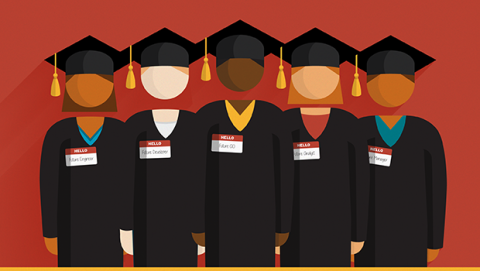With IT professionals in short supply, university computer science programs remain a significant source of would-be new hires for CIOs. However, many IT leaders say that computer science graduates are often not ready to hit the ground running in corporate IT.
[ Read our related story, How one CIO thinks outside the box to fill cybersecurity jobs. ]
The core classes required of computer science majors deserve scrutiny, some CIOs say. Think about this: What would you like to see changed in the curriculum that students study as they prepare for a career in IT? “Minimize calculus: It is an artificial barrier to attracting, retaining, and graduating computer scientists,” says Curt Carver, VP and CIO, University of Alabama at Birmingham.
“Having worked in the technology field for 35 years including leading technology organizations and holding a full professor position, I have never used calculus to solve a practical problem,” Carver says. “Focus instead on projects (lots of them) and minimize lecture. Work on teams in a meaningful way.”
Beyond the core classes, IT leaders seek alignment with today’s most-wanted IT skills.
“There has been and will continue to be high demand for computer science graduates with a deep and broad understanding of building highly scalable, distributed systems,” says Matt Mead, CTO of SPR. “Despite this, there are some areas where computer science programs can improve.”
Specifically, corporate technology leaders bemoan the lack of practical skills in critical areas from cloud computing and agile processes to emerging capabilities in artificial intelligence and data science.
However, there are some interesting efforts emerging – some introduced by leading universities and other more focused programs and partnerships initiated by IT leaders themselves – that suggest a way forward on these fronts. Let’s take a peek at some examples:
Cloud computing
For the third year in a row, cloud and distributed computing was the top technical skill to get you hired in 2018, according to LinkedIn. Cloud has fast become the norm in corporate IT, but not so in the halls of computer science programs. “Having no familiarity with this space puts graduates at a disadvantage when interviewing for their first job,” says Mead, who worries that many programs fail to give students the opportunity to become familiar with newer technologies that are fundamentally changing traditional IT approaches like no-SQL databases and serverless architectures. (Read our related article: What is serverless? )
Mead, like many IT leaders, is actively involved in coming up with solutions locally as a member of Loyola University’s Computer Science Program Advisory Committee, a group of 20 senior IT leaders from the Chicago area who provide feedback on the computer science curriculum.
There are some cloud-focused degree programs popping up around the country. Stevens Institute of Technology, for example, has an Enterprise & Cloud Computing Master’s Program to provide enterprise IT professionals with an “in-depth education on reliability and security in distributed computing and service-oriented architecture,” emphasizing systems administration and governance and covering the design and implementation of enterprise software systems that rely on the cloud.
The University of Maryland University College’s Cloud Computing Architecture Master’s Degree teaches students how to effectively design cloud environment and transform traditional IT infrastructure for the cloud.
Artificial intelligence
While cloud computing is IT’s present, artificial intelligence (AI) in many ways is its future. The practical application of AI in the enterprise has not typically been taught at the undergraduate level. But that’s beginning to change. Earlier this year, Carnegie Mellon University launched its bachelor of science degree in Artificial Intelligence to address the growing demand addresses for AI specialists in the marketplace.
Offering the first undergraduate AI degree in the U.S., the program will focus on providing students with in-depth knowledge of how to transform large amounts of data into actionable decisions.
CMU’s bachelor’s degree program in computer science “teaches students to think broadly about methods that can accomplish a wide variety of tasks across many disciplines”, research professor of robotics and computer science and director of the new AI degree program Reid Simmons said in a statement. However, the bachelor’s degree in AI "will focus more on how complex inputs, such as vision, language, and huge databases, are used to make decisions or enhance human capabilities."







Comments
This is nothing new.
More than anything, it is up to the students to go after specific areas of employment during graduation. College is over all about foundation, ensuring the student will have the mindset to grow and adjust to the future, not present.
The information about computer science has been well described and hope that we will get this kind of stuff in the future also.
https://www.pcsupportnumber.co.uk/blog/fix-windows-error-code-0x80004005/